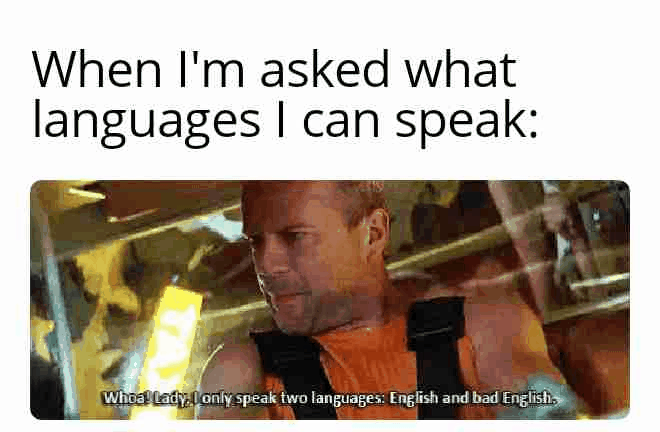Alternatively, in the languages I speak:
Welche Sprachen sprechen Sie? (Deutsch/German)
¿Qué idiomas habla usted? (Español/Spanish)
Quelle langue parlez-vous? (Français/French)
EDIT: These sentences are now up to date.
Was Sprachen Sie spricht? (Deutsch/German)
I’m not a native speaker, but I’m pretty sure it’s
Welche Sprachen sprechen Sie?
assuming you want to be formal, which feels a little weird to me in the context of an internet forum.
Edit: but to answer your question: fluent English, mehr als ein Bißchen Deutsch, y un poquito Español.
I would like to know how a native german speaker would say it. But I would say like you
Well, if I were to post it to a community on e.g. feddit.org, I would write it as:
Welche Fremdsprachen sprecht ihr so?
“Fremdsprachen” just means “foreign languages”, since I know that responding folks speak German.
Then “sprecht ihr” rather than “sprechen Sie”, because addressing a group of people with direct pronoun is unusual in German.
As someone else already said, using “Sie” is also far too formal for this context. People refer to each other as “Du” on most of the internet.
But “Welche Sprachen sprichst Du?” still gives me vibes of a marketing firm hoping to drive engagement by referring to people directly.And then the “so”, I have no idea what that is linguistically, but it basically makes the question more casual. It invites for people to tell a story or to have a chat.
Thanks for the detailed answer. Interestingly it is pretty similar to the idiomatic way to say it in French. Except for the “so”
“So” is indeed one of those small things that’s just colloquial to casual conversation in in Germany. To me personally it signals that you weren’t as exact with your question so you’re leaving it kinda open ended to some degree. But when it comes to Grammar no clue what this is.
It feels a bit similar to “do you speak any other languages or ~” because this leaves it less as a direct question and more as an open ended conversation, suggesting you just wanna know more and you’re not very particular in your question and in what you expect as an answer.
ein Bißchen Deutsch
BTW, this should be written as:
ein bisschen Deutsch
We switched from ß to ss in all words with a preceding short vowel in 1996: https://de.wikipedia.org/wiki/Reform_der_deutschen_Rechtschreibung_von_1996
So, it’s “Fuß” and “Maß”, because those are pronounced with a long vowel, but then “Fass” and “muss” and “Biss”, because those are pronounced with a short vowel.And in this case, “bisschen” is spelled with a small “b” for reasons that I’m not entirely sure are logical. 😅
It would be spelled with a capital letter, if “Bisschen” was a unit of measurement here (i.e. a small bite), like a “Liter” is.
But because it was used so much and without really referring to a specific measurement, it eventually began being spelled lowercase, similar to “wenig” or “etwas” (“ein wenig Deutsch”, “etwas Deutsch”). Apparently, this kind of word is called an “Indefinitpronomen”.https://de.wiktionary.org/wiki/bisschen
vs.
https://de.wiktionary.org/wiki/Bisschen (much rarer)Thanks! It’s surprisingly difficult to get Germans to correct me on things. Most of them are just happy that I can speak it at all, so they tell me not to worry about the little stuff. 😂
It is indeed normal to use ‘du’ pretty much everywhere on the internet. Even in French i never see ‘vous’ (which to me feels more common than Sie in German usually).
Sehr gut, danke! Muy bien!
Removed by mod
I mean. im not so good at english as a native speaker. near the end of college my friend and I traded transcripts and his comment was. you get pretty good grades. oh except in spanish. when I had classes that were straight up english classes I similarly did not do well.
English, Russian, Czech (used to be fluent, but haven’t used in a while), Mandarin (a bit, still learning)
in addition to my native brazilian portuguese, i’m fluent in english and basic to intermediate level in spanish and french. i can understand and speak roughly some german and russian too (started the courses, but never finished). my objective is to someday learn both german and russian up to intermediate level, and then go for some arabic, mandarin, kongo, nheengatu (an old creole language that mixed tupi-guarani and portuguese) and esperanto.
I speak English. Je ne parle qu’un peu le français.
English Spanish Portuguese
I want to learn Russian and Chinese
Spanish, english, german.
German (native), English (not native-level but compared to my work colleagues I might as well be lol) and some American Sign Language (I can carry a simple conversation as long as I may fingerspell words I don’t know yet/anymore)
พูดภาษาไทยได้ครับ ພາສາລາວດ້ວຍເດີ້
English, and the teeniest, tiniest bit of Spanish.
My Spanish is in a southern accent, and doesn’t even reach the fluency of a damn toddler.
I have more latin under my belt from medical terminology, which I guess is sort of a language of its own. I’ve been out of the field for over a decade, and I still do well with it casually reading publications that interest me. But I don’t really have enough of the latin to equate to being able to speak latin, or even read it. Same with the greek that’s folded into medicalese.
So just english in any real sense, though I can kinda read Spanish well enough I guess, as long as I have access to a dictionary lol.
English. Poorly.
Polish
English
Learning German and Spanish
I only speak two languages: English and bad English.

Aw, I was gonna make that joke
deleted by creator
Englisch and jeeburriche






